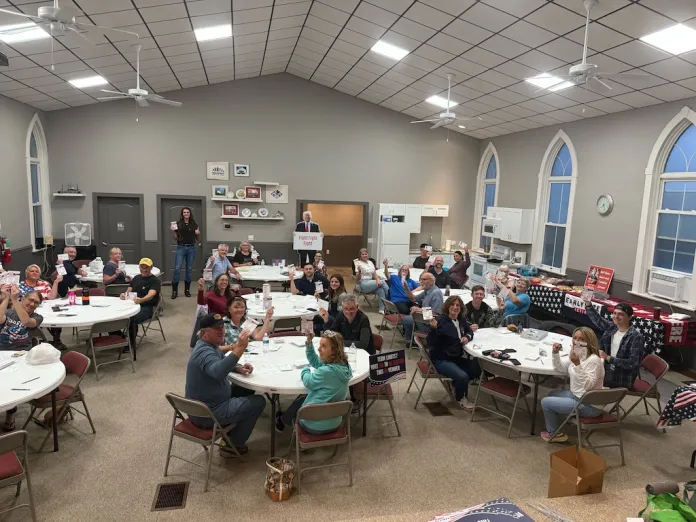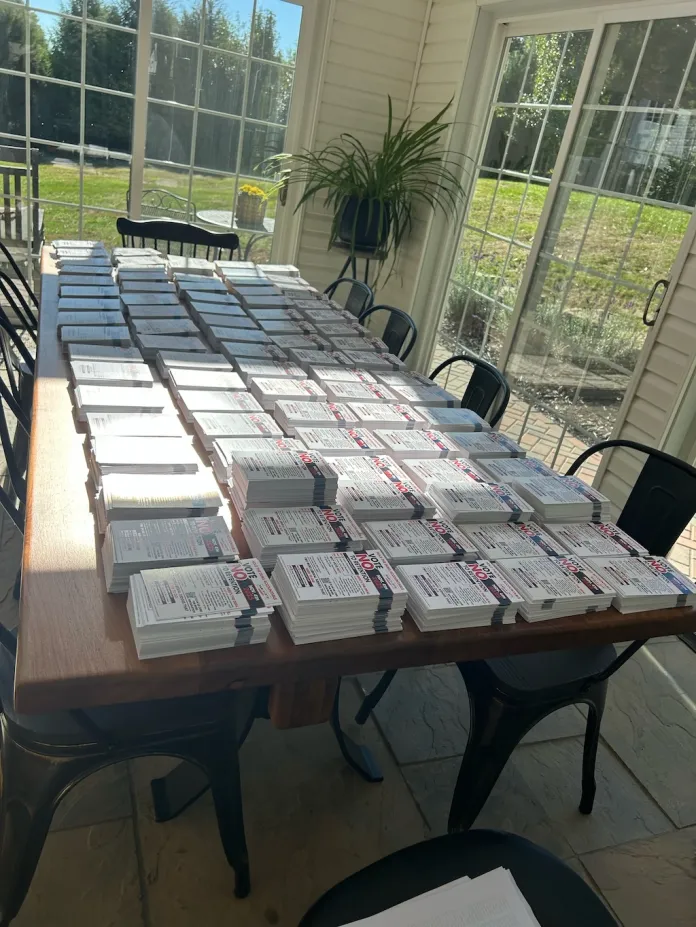


SLIPPERY ROCK, Pennsylvania — Last weekend, Tricia Aulbach was on a mission to reach out to people who, to put it mildly, have long been considered low-propensity voters.
The regional director of Early Vote Action, a grassroots organization founded by Scott Presler whose mission is to register and energize Republican voters, said she rented out a local community center to house volunteers who would send 10,000 postcards to local Amish voters in Mercer and Lawrence counties.
Recommended Stories
- Navy moves full speed ahead with rebuilding 'warrior ethos' under Phelan's leadership
- Trump immigration officials still struggling with Biden's legacy
- Will Zach Bryan write a song about murdered women Laken Riley and Rachel Morin?
TRUMP GIVES EARLE-SEARS THE COLD SHOULDER AS HE WADES INTO VIRGINIA RACES
Their objective is to tap into the Amish vote once again and remind them to vote “no” on the retention of three state Supreme Court justices in the Nov. 4 election.

Only once in Pennsylvania politics has a grassroots effort been successful in denying a sitting judge’s retention. That happened in 2005 when a poorly funded campaign to repeal pay raises for state officials turned into a grassroots populist movement to upend two members of the state’s highest court.
The populist movement was fueled by voter anger about the state legislature voting that summer to raise its base salary by $12,000, with leadership and the governor, his Cabinet, and judges receiving significantly more. Worse, the pay raise was passed at around 2:00 a.m., giving it an aura of secrecy.
Voters were angry and wanted someone to pay a price. However, no legislators were up for election that fall. The repeal movement turned its ire on two justices on the seven-member state Supreme Court: Russell Nigro and Sandra Newman, who were seeking second 10-year terms. Neither had any role in the raises.
Nigro lost, Newman survived, and grassroots activists in the state are hopeful their under-the-radar effort will have the same effect.
The current justices up for retention, Kevin Dougherty, Christine Donohue, and David Wecht, do not face opponents, only a “yes or no” vote on whether to extend their terms. All three have made rulings that have caused growing anger within the conservative populist movement over the years, including redrawing congressional districts to favor Democrats.
It is under-the-radar grassroots efforts like Aulbach’s here and across the state, reaching low-propensity voters, that could have an impact on an election cycle few pay attention to in off years.
Aulbach, a mother of two and wife of a military veteran, said she got involved in grassroots politics right after President Donald Trump was shot here in Butler County in July 2024.
“I watched it live on television, and I literally was beside myself. I’ve always been a Republican. When Trump got shot, I called the mayor in Slippery Rock, who I didn’t know at the time, and asked him how I could get involved,” she said.
The mayor, JD Longo, put her in touch with the local GOP committee. She worked a couple of register-to-vote booths, but she wanted to get in the trenches. Longo called her a week later and offered her the ability to do just that and work with Early Vote Action.
Presler told her in an offhand remark that he believed the Amish, who rarely vote, could be the key to the election if the organization could somehow get them to vote.
Aulbach’s reaction was a broad smile.
“I see them all the time. They sell doughnuts at our farmers market. I’m going to do this. So I started going house to house, just knocking on doors, talking to Amish,” she said of the very personal and intimate way to earn their trust and their vote.
It is difficult to determine if the Amish were the reason Trump won. However, in a tight election, every vote matters. In January, Aulbach said she started engaging with the Amish again for this off-year cycle.
“I think it was over 150 new 18-year-olds since the last election. I went all winter, home to home, asking if I could register their kids that would be 18 before the election,” she said.
“They’re very receptive. We actually had 40 drivers come out for the last election to help them get to early voting. A lot of them will actually drive their buggies themselves as the weather permits. But it was honestly the most rewarding work, besides motherhood, that I’ve ever done,” she said.

For this past weekend’s efforts, Presler told Aulbach they had a list of about 10,000 Amish voters across Pennsylvania they wanted to hit with postcards to inform them of voting “no” for retention.
“It is also important for them to understand how relevant state Supreme Court decisions are to their way of life because the state Supreme Court in New York just decided that Amish children in Amish schools have to be vaccinated. So when you let them know that while it is not a decision here, but that that could come to Pennsylvania if we keep letting our Supreme Court be run by Democrats, it makes them think,” she said.
Aulbach said sometimes you will have a conversation with an Amish person who will say, “We don’t vote for judges,” and that “God instills our judges.”
“My argument to that is, OK, well, you can want to grow corn out in your field, but if you don’t plant the seed, the corn won’t grow, no matter how much you pray to God for it to grow. So if we don’t do our part, then it’s not going to work. And a lot of times, actually, that does resonate with them.”
BY STANDING BY JAY JONES, VIRGINIA DEMOCRATS GIVE PERMISSION SLIP TO THE VIOLENT LEFT
There is also the case of the Amish farmer who has waged a multiyear legal battle over selling raw milk. The state filed a lawsuit to halt Amos Miller’s unregulated raw milk operation and fined him for violating food safety requirements. The case has not yet made it to the state Supreme Court. However, a judge ruled he can continue to ship his products out of state to members of his buyer’s club. He just can’t sell them in Pennsylvania.
“You have to think about what motivates voters in their community, and this is one of them,” Aulbach said. “Every vote counts, no matter how small it is. It makes a difference, and we are trying to be part of making that difference.”
